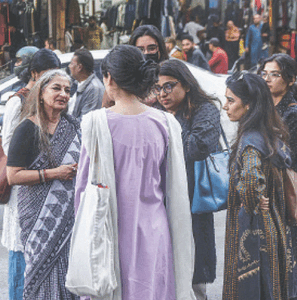KARACHI: Comprehensive policies, opportunistic screening, culturally-relevant measures and universal healthcare are needed to improve Pakistani women’s access to healthcare and thereby improving their quality of life, said experts at a public awareness session held here on Wednesday.
The all-women panels at the ‘Dialogue for Diagnostics’ forum held by Roche highlighted the impediments that led to growing disparity in healthcare and prevented women from seeking diagnoses.
Discussing the ‘spotlight on women’s health’, the audience was informed that women were at a greater risk of diseases — including diabetes, cancers, heart ailments and arthritis — with the delay in diagnosis making their situation worse.
In a panel discussion on ‘Addressing Gender Inequalities in Healthcare’ moderated by Institute of Public Health Dean Dr Zarfishan Tahir, Dr Huma Qureshi, consultant gastroenterologist and national lead on viral hepatitis, highlighted the restrictions on women’s mobility and decision making. “Women can make choices for their children’s health and can go to a doctor if a child is ill. However, they do not have the agency to go to a doctor for their own health.”
Need for integrated diagnostics, trained workforce and cohesive policies with a gendered lens stressed
“It’s a sad state of affairs. Mard ijazat nahi dete. If men agree to take women to hospitals, it’s usually after work and by then hospitals ka time khatam ho gaya hota hay,” she said.
Dr Qureshi called for a change in the health service model where hospital OPDs function between 8am-2pm. “This limits women access, especially those who are dependent on husbands or male family members to go to hospitals. From 8am to 8pm or 24/7 is the way to go as it offers them flexibility.”
On the occasion, Dr Naveen Faridi, head of the pathology department at Liaqat National Hospital & Medical College, shared that Karachi had the highest number of breast cancer cases in South Asia.
“Breast cancer cases have gone up. Every week, 20 women are diagnosed [at Liaqat National Hospital],” she said. “Most women feel shy [talking about breasts] and lack the knowledge that is essential and could help them reach a doctor at the earliest.”
In the ‘Rethinking & Redefining Women’s Health’ panel discussion, Dr Shehla Zaidi, professor of health policy and systems at the Aga Khan University, called for the need to integrated diagnostics. “Think downstream and low cost. Go for rapid tests.”
She noted that policies were often too fragmented and must be cohesive. She further called for a “gendered lens” when formulating policies.
Dr Bushra Jamil, professor of medicine and infectious diseases at Aga Khan University Hospital and president of the Medical Microbiology & Infectious Diseases Society Pakistan, said that diagnostic access is linked to education and awareness. “Most importantly, a trained workforce is essential. The right kind of workforce which can interpret results, link these to reporting and then these are linked to the national database,” she added.
Noting that women can be in a decision-making position or subversive depending on their circumstances, regardless of them being in rural or urban areas, she called for culturally-sensitive and locally-relevant solutions. Increased education and awareness — particularly sensitising men — can lead to improved health seeking behaviour in women, she added.
Dr Jamil also called for increasing the number and scope of lady health workers (LHWs). “The LHWs are being overburdened. They were trained for one programme initially and now are dealing with multiple ones. There is need to develop their expertise in specialised areas”, so that they can deliver effectively to the most disadvantageous women and children.
On the occasion, Dr Sara Zuberi Salman, provincial head of the WHO Sindh office, shared the programmes that were being implemented in the province.
Published in Dawn, March 17th, 2022

































